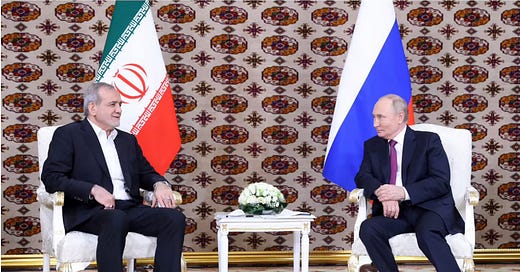Persian Fire
Russia-Iran Comprehensive Strategic Partnership Agreement. Putin meets Masoud Pezeshkian in Turkmenistan, Moscow and Tehran actively cooperate with each other in the international arena
Russia's Putin, new Iranian President Pezeshkian hold first in person meeting in Turkmenistan
Russian President Vladimir Putin highlighted on Friday the importance of relations with Iran during his first meeting with the Islamic republic's new president, Masoud Pezeshkian, in Ashgabat, Turkmenistan.
The meeting was on the sidelines of the Interrelation of…





